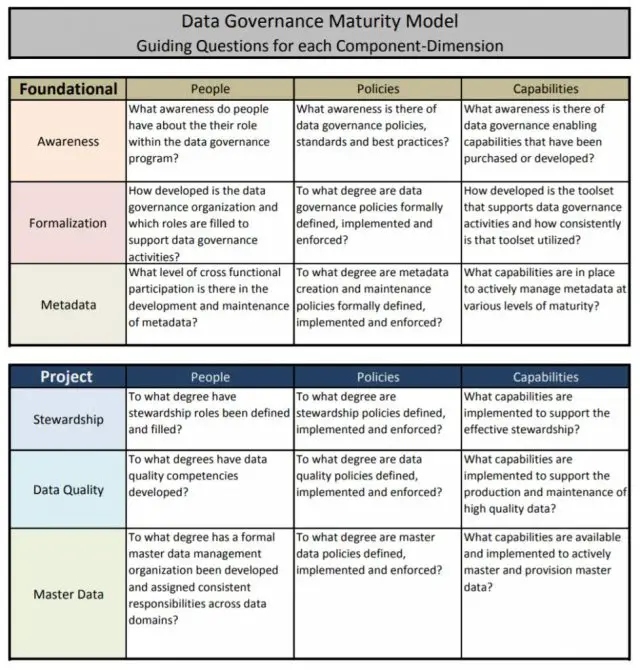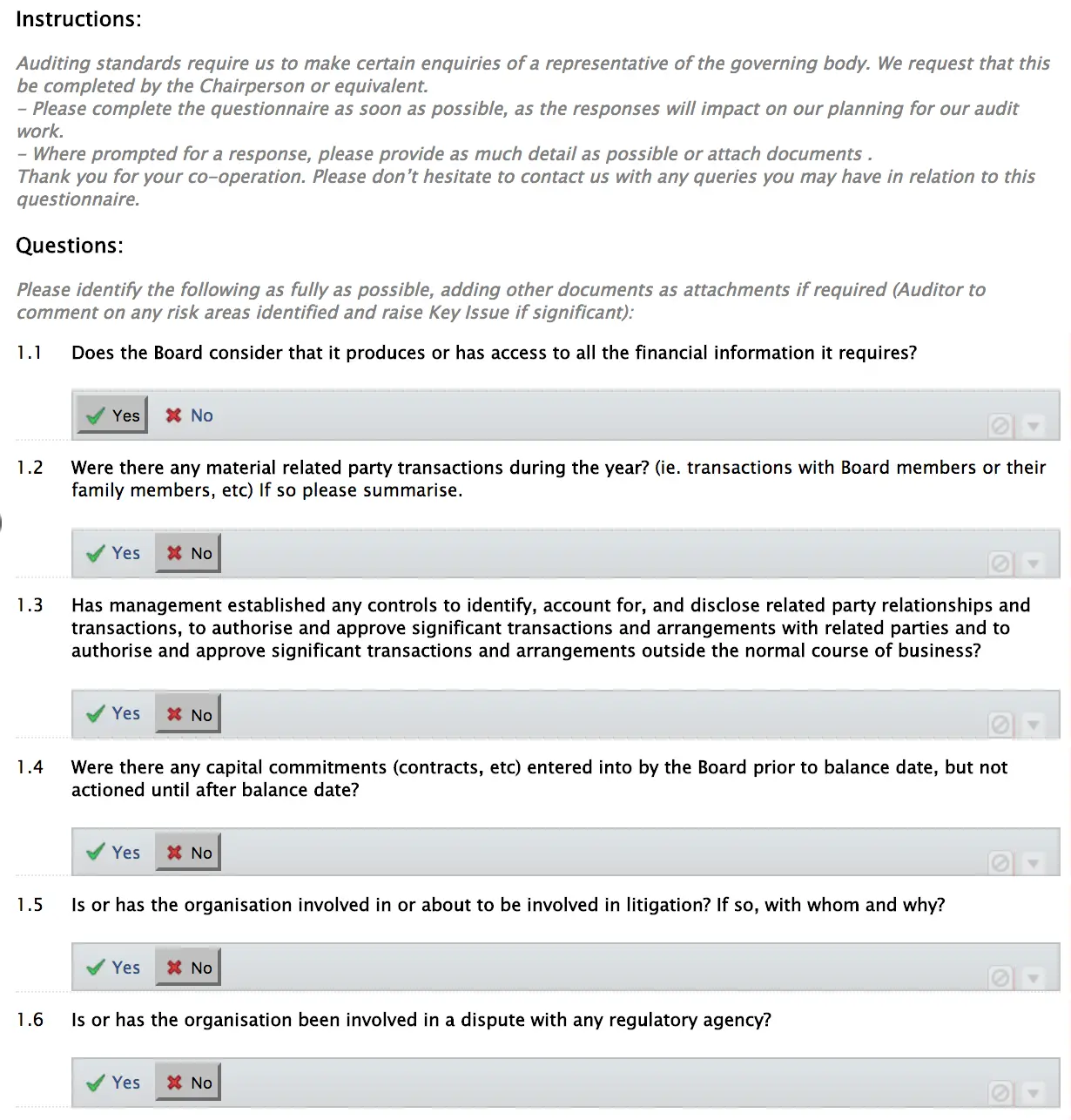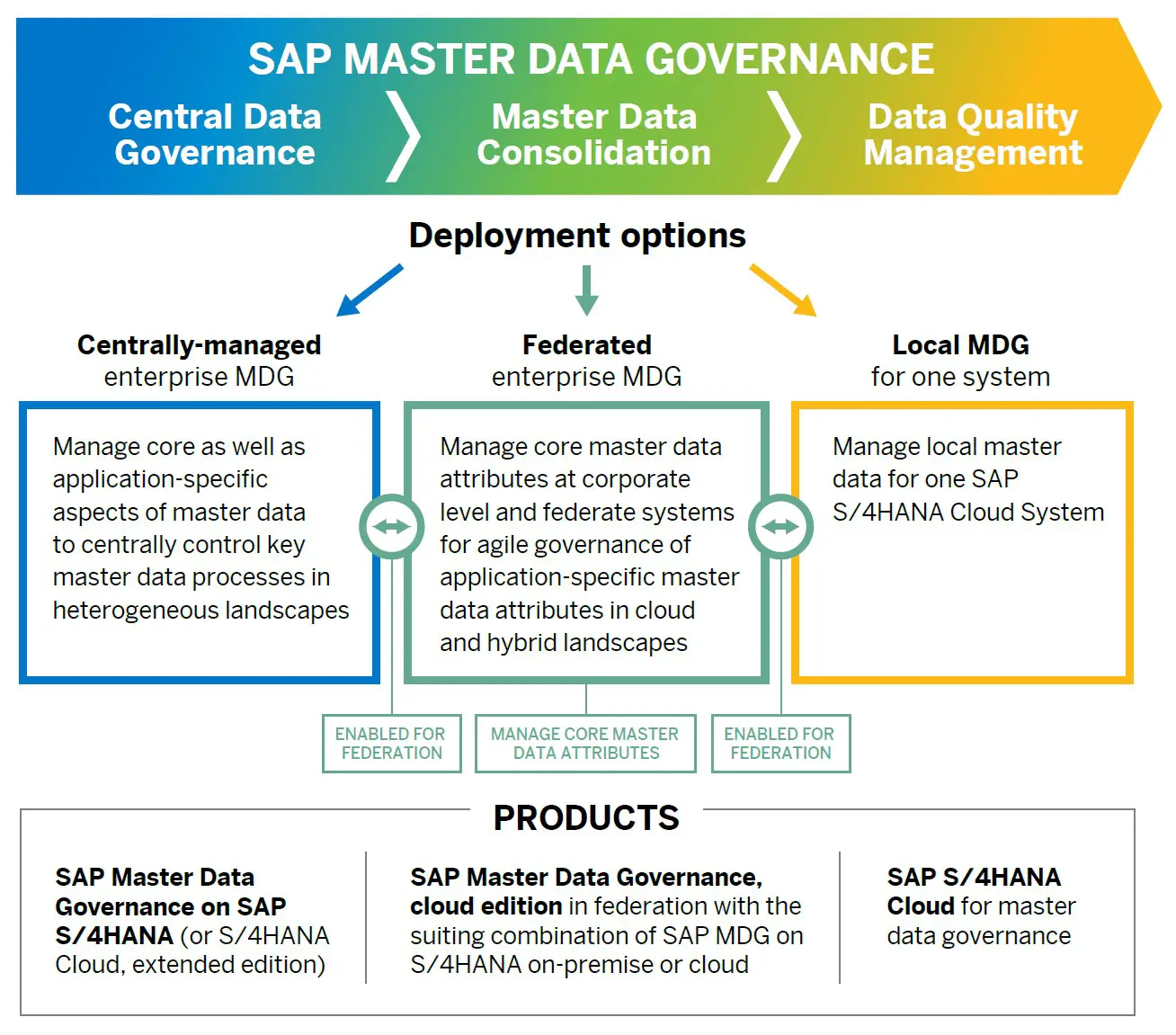Hesitation To Start A Data Governance Program:
Question: What would you say to someone who may be hesitant or intimidated to start a Data Governance program?
Answer:Where to start a Data Governance Program can be overwhelming because it involves anything from the inception of the data, consumption of the data, retention/disposition of the data. At CCG we recommend following a methodology and framework. Although we have our own proven framework, theres a vast amount out there such as DAMA, CMMI, or AHIMA. Ultimately this allows organizations to follow a guide to tell them the areas they need to focus on. It is not recommended to just dig into one specific area, however. Looking at the whole picture and then doing a deeper dive is recommended to overcome challenges to data governance.
Data Governance For Marketers: A Brief Guide With Your Questions Answered
The term data governance can sound vague and a bit off-putting, so weve decided to answer some basic, foundational questions about the concept. The questions and answers below arent intended to be comprehensive, nor are they tailored to meet the specific data governance needs of your particular organization . Theyre meant to give you a clearer understanding and a starting point for more research.
What is data governance? Data governance defines the rules for who can take what action, upon what data, in what situations, using what methods, according to the The Essential Guide to Data Governance explains the importance of data governance as follows:
Data Governance is required to ensure that an organization’s information assets are securely, legally, functionally and efficiently managed throughout the enterprise to secure its trust and accountability. It drives the legal and ethical standards of the business and represents to its shareholders the strict guidelines to which the business adheres to both to its customers and the wider community.
This ad hoc approach doesnt lead to easily usable leads and quality customer data, but creates an un-hygenic mess of data spaghetti that will need to be untangled someday by someone . Good data governance prevents this data hygiene nightmare from happening.
What are the benefits of data governance? There are many benefits, but here are four of the most critical for marketers:
Previous Article
Next Article
How Do You Implement Data Governance
The first step in implementing Data Governance is to develop a crystal-clear understanding of your companys corporate strategy. Identify concrete business goals that can be achieved with data and define which specific data elements youll need to achieve them. With all this in mind, determine where improvements can be made to your existing data and procedures and begin drafting up new policies accordingly.
Read Also: Collection Account Student Loan Permanently Assigned To Government
If You Discovered A Contradiction Between Two Separate Data Management Policies What Would You Do
In my previous position, I discovered a conflicting data management policy addressing the retention of client data. A different policy specified that we should only store client information for one year following their most recent purchase, while the first said that we should maintain all customer information for five years. The boss and I opted to store client information for three years following their most recent purchase after deliberating the matter.
What Is The Goal Of Data Governance

Ans. The goal of data governance is to ensure that data is used effectively and efficiently across an organization while protecting its quality and integrity. Data governance helps businesses make better decisions by providing a single source of truth for all data sets. It also enables businesses to comply with regulations governing the use of data.
Recommended Reading: Federal Government Money Assistance Program
Interview Questions For A Data Governance Manager Role
Someone recently asked me what questions Id recommend asking in interviews for candidates applying for a Data Governance Manager role. Its been a couple of years since I helped a client with the recruitment process. I remembered a couple of questions that worked well but thought that since the data community are so supportive that this would be a great topic to collaborate on. I asked on LinkedIn for people to share their favourite/recommended questions with a plan to create a great resource for both those recruiting and those preparing for Data Governance job interviews and this blog is the result.
Please feel free to use and share this resource:
Give An Instance Of A Time You Had To Deal With A Challenging Stakeholder And Describe How You Handled The Matter
As a data governance analyst, I once worked with a stakeholder who had strong opinions about how we ought to arrange our data. Frequently, he would organize the facts on his own without first consulting me. Because they did not adhere to corporate standards, I found it challenging to implement several of the organizational changes he requested. To tackle this problem, I planned a meeting with him and explained why some procedures had to be left alone. He decided to allow me to continue implementing the organizational structure. I clarified the rationale behind each step, and he acknowledged my point of view.
You May Like: Flex Modification Is A Free Government Program
The Data Governing Body:
Question:Who does the data governing body consist of?
Answer:Every organization is different depending on the existing operating model, organizational structure, or appetite for Data Governance. It is often defined a little bit different for every business. In general, however, the program is enabled through a committee or council. This can be defined as a group of employees from across the organization including all of the different operational areas, to have an equal vote and contribution, of what is going to be enabled when it comes to data strategy.
What Are The Components Of Data Governance
Data governance consists of the familiar trio of people, process, and technology. Many companies, however, dont implement all three components. Many think of data governance as a technology solution. Many think about it only from a data leak perspective and focus on closing off all potential leaks to external sources.
Actually, data governance is about 1) the data, 2) who has access to it, and 3) making sure that everyone who needs it has access to it. Technology, people, and process are all required to be effective.
You May Like: Free Government Cell Phone Providers
Think Big Start Small
In its pure essence, Collibra documents information about your data and makes it easy to retrieve. Imagine youre in a big library and you need to find a book about clients. Well, the librarian will tell you to go to the second floor on the left, second row under C, check! And thats exactly what Collibra does for your data.
Creating a library of all your data and documenting might seem like a big, daunting task. Collibra makes this very manageable by allowing you to document your data gradually. Theres no need to organize a huge documentation exercise within your company. You build your data library step by step and grow it organically. After all, data governance isnt a one-off project, its a continuous process.
A relevant example would be a company that wants to become GDPR compliant. They start documenting data from their BI reports by defining what the data is, which source the data is coming from, who the owner is and whether or not it contains personal or sensitive data. So instead of initiating a large project that might take years to finish, they start by gradually creating and extending their definitions and work their way towards a larger and larger library.
On top of that, youre working in a manner thats meaningful to your business and relevant to the business objectives. This way you can keep your long term vision in mind, but start with smaller, short term achievements, making your data governance manageable and much more likely to succeed.
The Most Frequently Asked Questions In Data Governance
Whether youre an accomplished business manager or a consummate data wizard, Data Governance can be a lot to wrap your head around. Luckily, this list of common questions and straight-to-the-point answers will help you get a better grip on the basics.
Heres our breakdown of the most frequently asked questions in Data Governance.
Also Check: Paper Application For Free Government Phone
Eight Questions On Data Governance: An Interview With Alation Co
Today, Alation announced its new approach to data governance, Active Data Governance, and with it, a series of initiatives to embrace data governance as a strategic use-case, all of which are part of Alations vision to transform the data catalog into a platform for a broad range of data intelligence solutions. I sat down with Aaron Kalb, co-founder and CDO of Alation, to discuss todays announcement, the journey to active governance, and what the future holds for the platform.
Nolan Necoechea, Alation:Aaron, thanks for taking the time to connect with me today. Whats your take on todays announcement?
Aaron Kalb, co-founder and CDO, Alation: Im really excited about todays announcement in particular because it demonstrates one of our core values: to measure success through customer impact.
We have been building data governance features into the platform for years. Whats new is that today we have a lot of exciting data governance stories from our customers and thats what Im proud to share.
Nolan:Was data governance something you were thinking about when the company was founded?
Nolan:What changed your and Satyens minds on data governance?
In the meantime, industry analysts, thought leaders, and data experts, began broadening the definition of data governance. The meaning expanded from just documenting policies to also include ensuring data is used the right way.
Nolan:How does the data catalog support this approach?
Why Do You Need Data Governance

Its important to place your data governance framework in context by reviewing the specific challenges caused by your current data management processes. Do they hinder your compliance efforts? Have you experienced issues with e-discovery during litigation? Do employees waste time searching for information they need? Do they make decisions based on outdated or incomplete data?
Documenting these challenges will help you develop a strategic roadmap that identifies focus areas for improvement and details a plan for achieving results.
Read Also: Government Construction Jobs For Bid
Question : How Can I Apply Data Lineage Into My Daily Practices
This is the most challenging question to answer. If you think that data lineage documentation is the most difficult step, you are wrong. Of course, data lineage documentation is a time and resource-consuming initiative. However, when data lineage is ready, a company faces the most significant challenge: bringing data lineage outcomes into business as usual operations. To allow business users to apply data lineage in their daily practices, data lineage should meet their needs and requirements. Furthermore, one big challenge is difficult to oversee at the beginning of the data lineage initiative: validation of data lineage quality. Validation of data lineage quality takes sufficiently more time than its documentation. The challenging question is, Who is accountable and responsible for data lineage validation? This answer is also not straightforward as it depends on multiple factors: the abstraction level and documentation methods, for example. In my opinion, business users who are supposed to use data lineage should be accountable for the validation. However, data management and IT professionals should assist and perform validation.
The essence of the answer is: to be effectively used, data lineage should meet the needs and requirements of targeted business stakeholders for whom it was originally developed.
For more answers to questions about data lineage, you can consult my book Data Lineage from a Business Perspective.
Technology In Data Governance:
Question:What would you say to an organization that may not think they have the technology to back a Data Governance Program.
Answer:Leading with technology is typically not the answer. Leading with policies, procedures, and workflows, often have better results. Ensuring that your organization is ready for Data Governance should be the first step before procuring an expensive technology. In lieu of technology, organizations can use SharePoint, Excel, or Microsoft word, to document different data elements without purchasing expensive technology right away.
Don’t Miss: Us Government Polygraph Training Program
Sponsor Spotlight Column: Stan Christiaens Of Collibra On Data Governance
by Charles Roe
In an effort to leverage the knowledge of several of the top minds in the Data Management industry, DATAVERSITY has been conducting a series of interviews on some of the most relevant topics in the field today. Recently, we interviewed Collibra the designers of Business Semantics Glossary, a web-based collaborative workspace, where both business and technical users define and manage their business context.
Collibra is a Gold Sponsor at the Enterprise Data World 2013 Conference in San Diego, CA from April 28-May 2, 2013.
The Sponsor Spotlight Column is an ongoing project that focuses on highlighting several of the central issues represented at the many Data Management conferences produced by DATAVERSITY.
The primary emphasis of the interview was to question Stan Christiaens and Collibra on their current work and history within the industry, with particular importance on the products and/or services being highlighted at the upcoming conference:
DATAVERSITY : Please tell us a little about yourself and your history in the industry e.g role at company , past experience and how you got started in the data profession?
DV: Whats the focus of the work do you currently do within your organization?
DV: What is the biggest change going on in your particular area of the industry at this time?
DV: How does such a change affect your job?
Collibra: It makes it a busy job :-).
Collibra: Ever busier.
Read Also: I Make Too Much Money For Government Assistance
How Do You Measure Data Governance Success
Measure the success of your Data Governance program by establishing key performance indicators ahead of time. Be sure to tie your KPIs to your organisations particular corporate strategy and concrete business objectives. This will ensure that you measure success in terms that are relatable to management and meaningful for the business as a whole. KPIs might track improvements in enterprise Data Quality, growth in the number of terms defined by business glossaries, or reductions in the amount of time spent searching for, organizing, and cleaning data. Another way to demonstrate success is by documenting improvements to your organizations Data Maturity level over time.
Read Also: How To Track My Government Phone
Hiring Here Are Some Data Governance Questions You Might Want To Ask
Thinking about interviewing someone for a data governance or data intelligence role such as a Data Governance Manager or a Data Governance Coordinator? Maybe this is a new role in the organization. Maybe data governance is new to the organization. Maybe this is a person that is already on staff and seeking a new challenge. When hiring someone, you want to make sure that they are a culture fit for the organization. You want to ask them questions that will allow them to give answers where you can make an informed decision about their fit for the position. Make sure that the job description is clearly defined and that the candidate has reviewed the description before the interview.
Questions About Previous Organization:10. What has been your biggest accomplishment in data governance?11. What has been your biggest challenge in data governance?12. How many data systems were included in your data governance efforts at your previous organization?13. What functional areas at your previous organization were included in the data governance efforts?14. Tell me about your experience with data stewards.15. What data governance tools/software/solutions have you used in the past?16. What were these tools used for and how effective were they?17. What was your involvement with these tools?
Top 25 Data Governance Interview Questions And Answers In 2022
Data governance is the strategy of overseeing data availability, accessibility, integrity, and security in corporate systems using internal data standards and policies that also control data usage. Data governance guarantees that data is consistent, trustworthy, and not misused. Its becoming increasingly important as firms confront new data privacy requirements and rely on data analytics to help optimize operations and drive business decisions.
If youre interviewing for the role of data governance manager, you can anticipate being asked a variety of questions concerning your data management experience and knowledge. You must also articulate how you would establish and implement data governance policies and processes.
Don’t Miss: Best Data Governance Tools Gartner
What Is A Business Glossary
A Business Glossary defines the meaning, format and uses of an organisations Critical Data Elements. Business glossaries are essential for keeping everyone on the same page. By contextualizing and defining individual data elements, they improve business understanding, save time on searching for reports and prevent misuse. Business glossaries encourage better data-driven decision making and are an essential part of Data Governance.
Are Your People Dedicated To Data Governance

Like any government, setting up the right technologies and processes do not guarantee good leadership. Its the people that determine whether governance is actually going to work. The tools and processes set up as part of a data governance framework will only work if people keep them up to date.
Communication between IT and business is critical, every step of the way. As IT sets up secure access to enterprise data and self-service analytics, it is business job to be open and candid about whats working and whats not. The business can lean on IT as a resource to manage processes once they are created. As for IT, they should expect to take on new governance roles in order to create a thriving, self-provisioning, and cost-effective analytical ecosystem.
Its worth taking a moment to ask yourself these questions as you strive to design best-in-class data governance. The payoff of good governance goes beyond data protection and integrity, driving business value, more informed strategic decisions, and a more agile, collaborative culture.
Read Also: Government Assistance Child Care Texas
